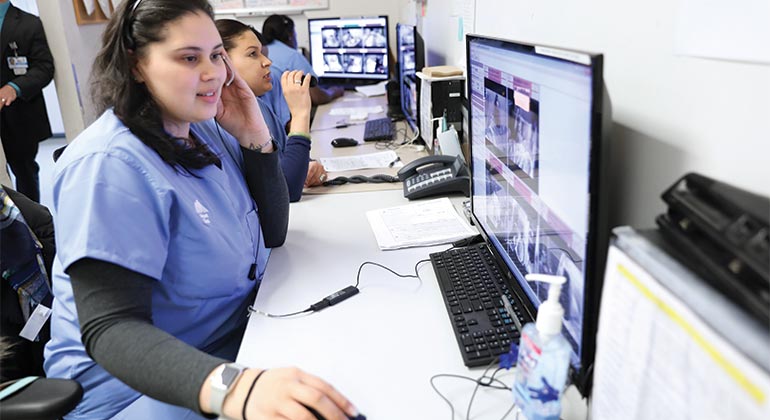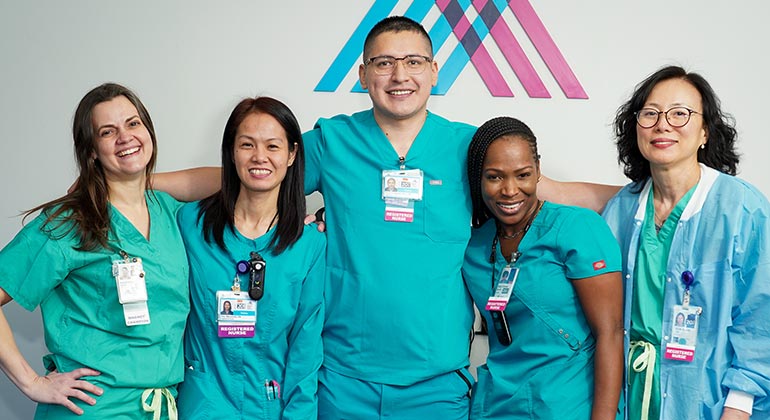Nursing Education and Professional Practice
Nursing education at the Mount Sinai Health System is built on the comprehensive and ongoing development of knowledge and skill. Whether working on inpatient floors, intensive care units, operating rooms, or ambulatory care centers, our nurses receive support to advance and grow their career. We believe that providing our nurses with advanced knowledge and skills sparks an interest in lifelong learning and paves the way for the pursuit of advanced education, board certifications, or involvement in professional organizations.
More importantly, through the continuous education of our nurses, we ensure that we are always serving our patients, their families, and our communities with the most updated, evidence-based care.
Learn more about our Advanced Practice Nursing Program.
Education Areas of Focus
Starting day one on the job, Mount Sinai supports the education of our nurses in a wide range of areas, including the following:
- Orientation: Our new nurses are accepted and oriented at a very high standard. We begin with a health system-wide nursing orientation, which brings new nurses together to learn about our professional practice model (which is relationship-centered care) and our care delivery model (which is modified primary nursing). We also give new nurses a taste for the values, mission, and vision of the Health System, and provide opportunities to meet each other. This centralized orientation is followed by site-specific presentations at the respective hospitals.
- Continuing education and professional development: With a strong commitment to providing ongoing knowledge and skills to our nurses, we have invested in a new blended approach of online learning and faculty-facilitated learning across a wide range of topics. Because there is always new information coming out, we provide a comprehensive regimen of continuing education occurring around each specialty.
- Mentorship Program: The Mount Sinai Health System Nursing Mentorship Program promotes a culture of mentorship, professional development, collaboration, mutual trust, respect, and teamwork. The foundation of the program exemplifies the professional practice model of relationship-based care focused on care of the patient, self, and colleague.
- In-services: Our units hold in-services related to areas such as new equipment, in which we partner with vendors. For example, if introducing a new bed we bring experts from the vendor to the units, so our nurses can learn at bedside.
- Competencies: Every year a unit’s managers and educators come together to identify the required competencies, which are areas of knowledge to be assessed and performed in a return demonstration. Annual competencies can include areas that are high risk/high volume and high risk/low volume.
- Cardiac life support: Another crucial area of ongoing education in cardiac life support, including basic, advanced, pediatric, and neonatal.
- Bedside teaching for complex conditions: This area of education troubleshoots complex clinical situations, where there is a need for teaching at the bedside with the educator acting as a resource. This is a fluid form of education that can happen from day-to-day, as needed.
- Practice alerts: If there is a need to reinforce or update an existing policy, procedure, or practice, or to introduce a new one, the unit’s manager and educator will share the responsibility of giving a practice alert.
- Reimbursements to support advanced education: An effective way to continue and broaden learning is to pursue opportunities outside the workplace. We encourage these efforts by offering tuition reimbursement as well as support for professional conferences and board certifications.


Mount Sinai Phillips School of Nursing
As an integral part of our health system, the Phillips School of Nursing at Mount Sinai offers a diversity of experiences that few schools can. Designated a Center of Excellence by the National League for Nursing, our school's curricula merge classroom teaching with practice at the Hillman Nursing Skills Center and Nerken Simulation Lab. Our clinical rotations are held in community and inpatient settings, giving students the chance to care for underserved populations. In addition, our superb faculty prepares students not only to become registered professional nurses, but also leaders and innovators committed to the highest quality patient care.
For those interested in an Accelerated Bachelor of Science in Nursing (ABSN) for second degree students who want to make a professional change, or registered nurses who wish to advance their careers with a Bachelor of Science Completion Program (RN-BSN), Phillips School of Nursing provides an outstanding education at an affordable cost in the heart of New York City.
Learn more about the Mount Sinai Phillips School of Nursing.